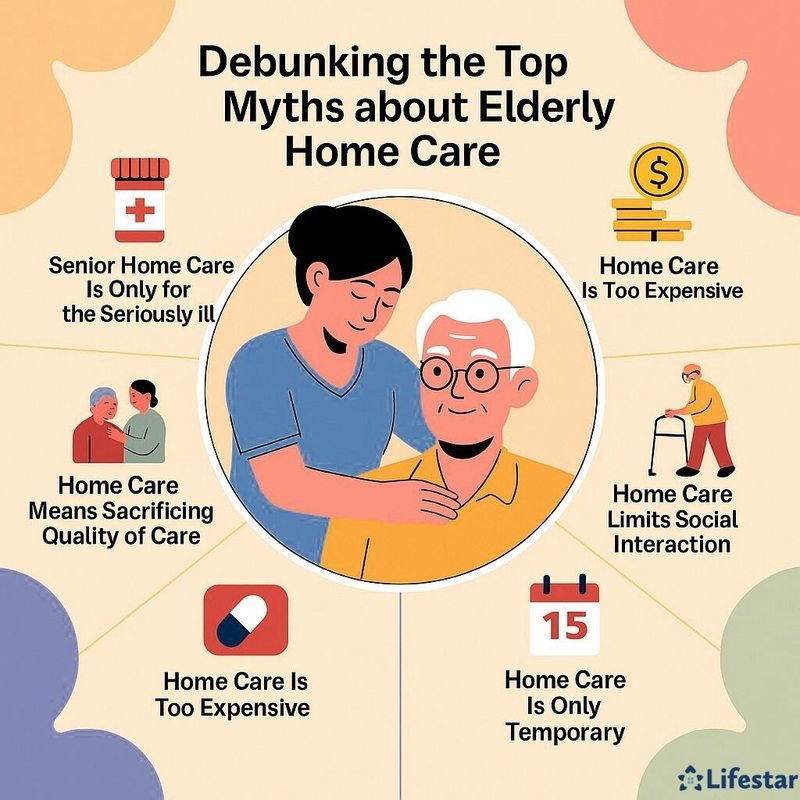
Table of Content
When it comes to senior home care, there are many misconceptions floating around that can prevent families from making informed decisions about their senior loved ones’ care needs. These myths often create unnecessary doubts and overshadow the incredible benefits senior home care provides. Let’s set the record straight by addressing some of the most common myths and uncovering the truth behind them.

Senior Home Care Is Only for the Seriously Ill
One of the biggest misconceptions is that home care is solely for seniors who are critically ill or bedridden. While home care certainly supports individuals with serious health conditions, it’s also an excellent option for seniors who need assistance with everyday tasks. Whether it’s help with housekeeping, meal preparation, or simply companionship, home care is designed to support a broad spectrum of needs. Many seniors who are independent but could use a little help prefer home care because it allows them to maintain their lifestyle and independence. Learning about patient qualifications for home care helps families understand that eligibility isn’t limited to only the most serious cases.
Living independently is important for seniors who want to maintain a high quality of life. For some, this simply means receiving help with tasks that have become more challenging to manage over time. Even when families have the best intentions, they may not have the time to provide the care their elderly loved ones need and deserve. If your loved one needs help for a few hours a day or a few days a week, reach out to Lifestar Home Care, a trusted provider of hourly care Oklahoma City seniors can depend on.
Home Care Is Too Expensive
It’s often assumed that senior home care is prohibitively expensive and only suitable for affluent families. However, the cost of home care is highly flexible and depends on the level of care required. For example, part-time care for a few hours a day or a few days a week is a cost-effective alternative to full-time residential care. Additionally, many insurance policies, long-term care plans, and Medicaid programs offer coverage for home care services, making it accessible to a wider range of families. When compared to the high costs of assisted living facilities or nursing homes, home care is often a more affordable solution.
Many seniors prefer aging in place over moving to assisted living facilities. If your senior loved one needs assistance to remain safe and comfortable while living at home, reach out to Lifestar Home Care, a leading home care agency. Our dedicated in-home caregivers can assist with meal prep, bathing and grooming, exercise, medication reminders, and many other important tasks. If you’re noticing a loss of appetite or mealtime struggles, be sure to read What to Do if an Aging Parent Won’t Eat for supportive tips and guidance.
Home Care Means Sacrificing Quality of Care
Some people believe the quality of care provided at home cannot match what’s offered in medical facilities. This couldn’t be further from the truth. Experienced and certified caregivers are trained to provide professional personalized care that meets each individual’s unique needs. From medication organization to help with physical therapy, home care providers are equipped to deliver top-tier services in the comfort of the senior’s home. The one-on-one attention seniors receive at home often enhances the quality of care compared to the shared resources in larger facilities.
Home Care Limits Social Interaction
Another myth is that seniors receiving home care will be isolated and lonely because they won’t get to interact with others like they would in a group setting. However, home care doesn’t mean seniors are cut off from the outside world. Caregivers often encourage social activities, accompany seniors to local events, and facilitate visits from family and friends. To better understand these benefits, learn about Nursing Home Care vs In-Home Care. Many seniors feel more comfortable and engaged when they have consistent one-on-one interactions with caregivers who truly get to know them, fostering deeper personal connections.
Home Care Is Only Temporary
Many people think of home care as a short-term solution, perhaps following surgery or a hospital stay. While home care is certainly beneficial during recovery periods, it’s also a long-term care option. Families can customize the duration and type of care their loved ones receive, whether it’s temporary support during a challenging time or ongoing assistance as their needs evolve. Home care adapts to the senior’s changing conditions, ensuring continuity and peace of mind for all involved.
When researching agencies that provide home care, Oklahoma City families are usually looking for flexible care plans, compassionate and highly trained caregivers, and 24/7 availability. Whether you need respite care to take a break from your caregiving duties or your senior loved one needs around-the-clock assistance at home, you can rely on Lifestar Home Care. Schedule a free in-home consultation by giving us a call today.